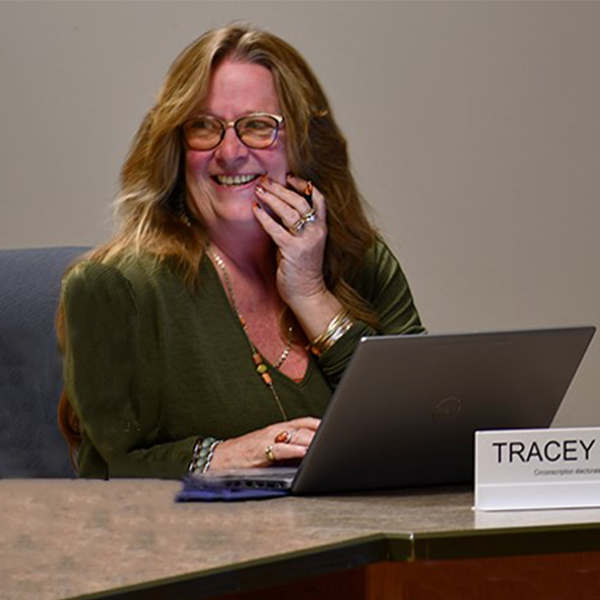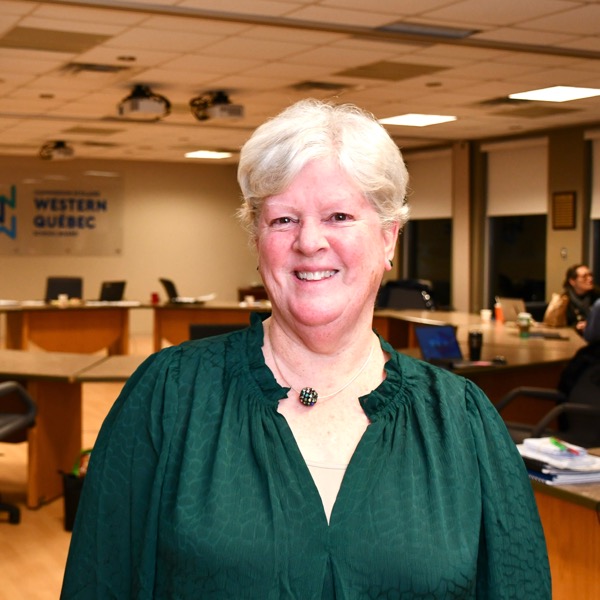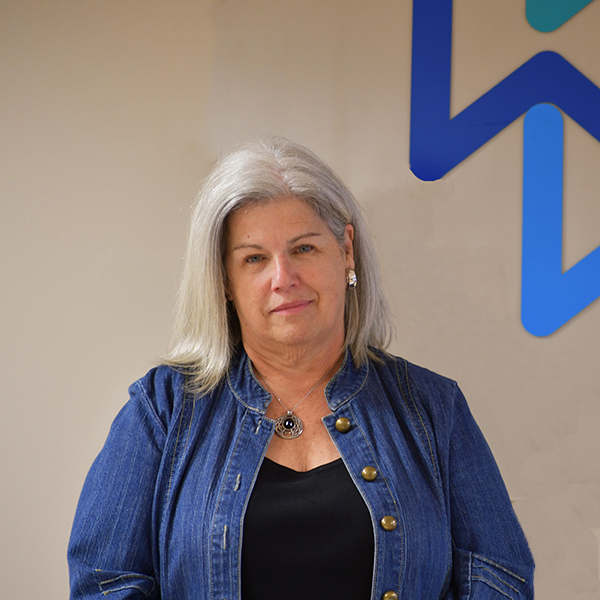In addition to schools having their own governing boards, the Western Québec School Board is itself governed by a council of 16 commissioners. These 16 commissioners are either elected every four years by eligible voters whose names are on the territory’s English Electors List, or appointed under the Education Act as parent-commissioners, respecting school-level elections (Parents’ Committee and governing boards). The person presiding over the Council is the chairperson of our school board.
On this page:
- Meet our Chairperson
- Meet your Commissioners
- Procedure to Attend or Participate
- Commissioners’ Role
- Become a Commissioner
- Board Elections
- Governing Boards at the School Level
- Parents’ Committee
- Special Education Advisory Committee
- Policies, bylaws, and other documents
See also:
Meet Chairwoman Joanne Labadie
Chair Joanne Labadie brings with her extensive governance experience, having served on numerous boards over the years, including as the former Mayor of the Municipality of Pontiac. Until recently, she held the position of political aide to a Member of Parliament and is currently employed by the Public Service Alliance of Canada.
Joanne served as the Commissioner for Ward 11 on the Council of Commissioners for a decade before being elected Chair in November 2024. Prior to this, she served 8 years as a member of the governing board of Eardley Elementary School, where her three children were enrolled.
Read more
A proud alumnus of D Arcy McGee High School, Chair Labadie is steadfast in her commitment to advocating for the advancement of high-quality English-language education in Quebec. In light of the ongoing uncertainty surrounding English-language school boards, particularly regarding the appeal of Bill 40, Chair Labadie’s substantial political expertise positions her to effectively advocate for minority language rights, with a specific emphasis on education for her community.
Chairwoman Joanne Labadie
Meet your Commissioners
The Council of Commissioners regularly meets once a month. Commissioners have important responsibilities defined in the Education Act of Québec. They have the responsibility to contribute to defining the school board’s directions and priorities and informing the Council of the needs and expectations of the population of their electoral division or their sector.
They are tasked with ensuring the schools and centres receive adequate support and see to quality of the educational services. They ensure the school board’s human, material and financial resources are managed effectively and efficiently. Finally, they carry out mandates granted by Council to provide information to the other council members on any specific matter.
In addition to these, commissioners, collectively, through the authority of Council, set policy, oversee the development and monitoring of the school board’s Commitment to Success Plan, approve contracts and adopt the annual budget of the Western Québec School Board.
Procedure to Attend or Participate
Council of Commissioner’s meetings are open to the public. As such, should you wish to attend and/or participate in the meeting, you are asked to send a request at least 24 hours prior, to the Office of the Secretary General.
Those wishing to address the Council may do so during the Public Participation Period, which is at 6:30 p.m. All individuals or groups wishing to ask questions or state their concerns during the Public Participation Period are asked to submit a request to the Secretary General at least 24 hours before to the meeting.
Commissioners’ Role
In 2020, French-language school boards were abolished by the Québec government, and replaced with school services centres. English-language school boards, however, retain their governance model.
School commissioners play a key role. Elected by the citizens, they determine the orientations of the school board, taking into consideration the interests of the students, parents and electors of their community.
Since the school board is an autonomous local government, the commissioners, who together make up the council of commissioners, exercise responsibilities comparable to those of municipal councillors.
Since 2014, the chairs of school boards are elected by universal suffrage, meaning that the electors choose the person who will chair their local school board.
The commissioner decides on the following matters:
- the orientations and priorities of the school board;
- educational and administrative policies;
- the school board’s strategic plan;
- the use of schools and training centres under the school board’s jurisdiction;
- the equitable distribution of human, material and financial resources among the schools and training centres;
- the school transportation policy (including fees and walking distances);
- summer courses offered and related fees;
- awarding of professional service contracts (eg. in architecture or engineering) or hygiene and sanitation service contracts;
- the budget orientations and expenses to be authorized;
- the Policy on School Daycare Services;
- affiliation with national or international organizations (e.g. International Baccalaureate) or withdrawal from these organizations;
- fees for renting out rooms or space to municipal or community organizations;
- social projects to prevent students from dropping out or to eliminate violence and bullying.
Become a Commissioner
Every person who is entitled to have his or her name entered on the list of electors and who, on polling day, has been domiciled on WQ territory for at least six months may be elected as a Commissioner. Notice will be given prior to the next elections. This notice will include all the information needed to file for nomination. For more information, refer to the Directeur Général des Élections du Québec.
Board Elections
In 2020, French-language school boards were abolished by the Québec government, and replaced with school services centres. English-language school boards, however, retain their governance model.
The WQ territory is divided into 11 electoral divisions. Each division elects one commissioner.
Electors list
School democracy concerns all Western Quebecers. Parents of children attending a school, adults attending an adult education centre or a vocational training centre, and citizens who care about the vitality of their neighbourhood all have an interest in participating in the election process.
To be able to exercise your right to vote, you must first be registered on the permanent list of electors of the Directeur Général des Élections du Québec.
If you have one or more children enrolled at the WQSB, you will be registered for its elections by default, as long as you reside on its territory.
If you do not have children, or have children enrolled neither at the WQSB nor at the French-language school board serving your domicile, you will by default be entered on the list of electors of the French-language school board. However, you can always choose to enter the WQSB Electors list instead, by submitting a filled Opt-in Opt-out form to the General Directorate.
Governing Boards at the School Level
Each of the 30 WQ schools has its own governing board. It is made up of an equal number of staff members and parents. The governing board plays a crucial role in determining a school’s direction and works in conjunction with the school principal.
The governing board is responsible for approving and overseeing a variety of issues including educational projects and the implementation of school budgets, regulation and student supervision policies. The board is also involved in the choice of school textbooks and other instructional materials, school closures as well as the selection process for the appointment of the school principal and confessional status.
For more information about a specific school’s governing board, contact it or visit its website.
Parents’ Committee
The Parents’ Committee is an advisory committee to the school board. Each school within the board’s territory has a representative on the committee chosen from the parent members sitting on each governing board. A representative from the Special Education Advisory Committee (SEAC) also sits on the committee.
Its primary role consists of representing parents’ interests within the school board. The main responsibilities are:
- to promote the participation of parents in school board activities and committees;
- to advise the school board on any matter the latter is required to submit to it;
- to advise the school board on any matter conducive to the most efficient operation possible and;
- to inform the school board as to the needs identified by the parent representatives.
Four Parent Commissioners, one for Elementary, one for Secondary, one for Kindergarten to 11 (K-11), and one from SEAC are elected from this committee to sit on the Council of Commissioners. One Parent Commissioner is also elected to sit on other committees of the school board, such as Executive, Transportation, SEAC, Governance & Ethics, Audit, and Human Resources. Representation at the standing committee level is very important. It is at this level that many issues are raised, policies worked out and decisions taken for recommendation to the Council of Commissioners.
The Parents’ Committee is also to be consulted on the following matters:
- the division, annexation or amalgamation of the territory of the school board;
- the school board’s strategic plan;
- the three-year plan of allocation and destination of the immovables of the school board, the list of schools, and the deeds of establishment;
- the policy in respect to the “continued operation or closing of schools”;
- the financial contribution policy;
- the distribution of educational services among the schools;
- the criteria referred to in section 239 for the enrolment of students in schools;
- the dedication of a school to a special project pursuant to section 240 and the criteria for the enrollment of students in that school;
- the school calendar;
- the rules governing promotion from elementary school to secondary school or from the first cycle to the second cycle of the secondary level;
- the objectives and principles governing the allocation of subsidies, school taxation proceeds and other revenues among educational institutions as well as the criteria pertaining thereto, and the objectives, principles and criteria used to determine the amount to be withheld by the school board for its need and those of its committees;
- the learning activities established by the school board and intended for parents.
Special Education Advisory Committee
Every school board establishes an advisory committee on services for students with special needs and students with social or learning disabilities or difficulties.
Mandate
The Special Education Advisory Committee (SEAC) on services for handicapped students and students with social maladjustments or learning disabilities has four functions:
- to advise the school board on a policy for the organization of educational services to handicapped students and students with social maladjustments or learning disabilities;
- to advise the resource allocation committee and the school board on the allocation of financial resources to the services intended for those students;
- to advise the school board on its commitment-to-success plan;
- to advise the school board on the implementation of an individualized education plan for a handicapped student or a student with social maladjustments or learning disabilities.
Membership
If you have a child in our school board who also has an Individualized Education Plan (IEP) and are interested in becoming a member of SEAC, please inquire at your child’s school for further information.
The Council of Commissioners determines the number of representatives from each group with the representation of parents constituting a majority of the members.
As per the Education Act (s. 185), parent members of SEAC will be designated by the Parents’ Committee.
As determined by the council of commissioners (Sept 2018) the composition of our school board’s SEAC includes voting and non-voting members.
Voting Members
- 16 parents of the students concerned (students with an IEP), designated by the Parents’ Committee
- 1 teacher representative, designated by their Association
- 1 non-teaching professional staff representative, designated by their Association
- 1 support staff representative, designated by their Association
- 1 school principal, designated by the Director General
- Up to 2 representatives of organizations which provide services to students with special needs, designated by Council, after consulting with those bodies
Non-Voting Member
- The Director General or a designate















